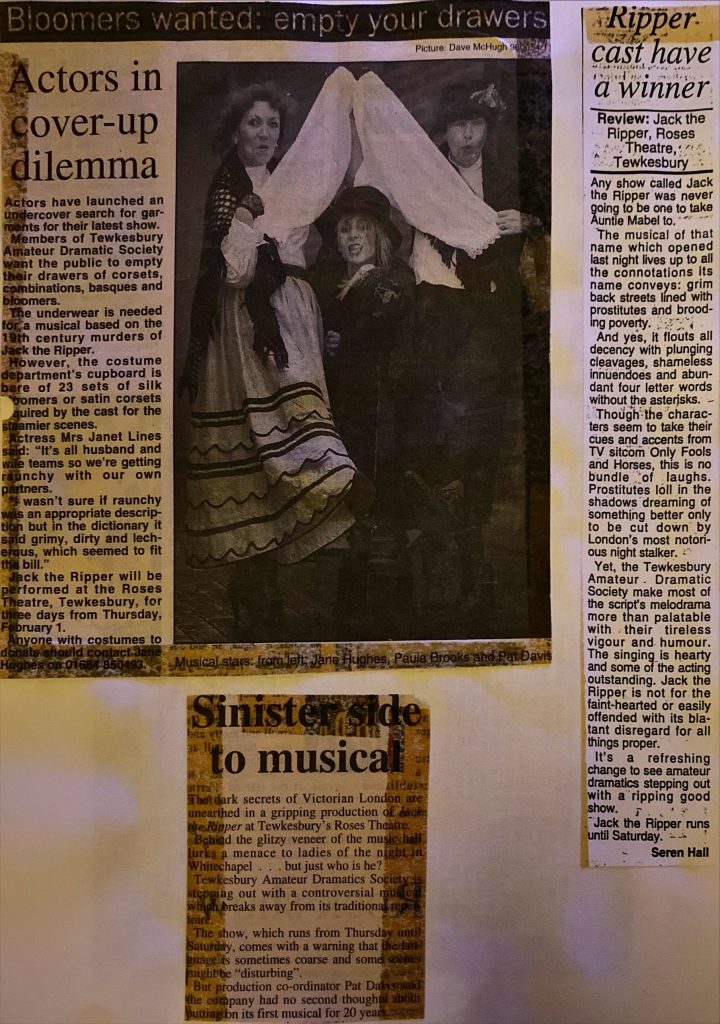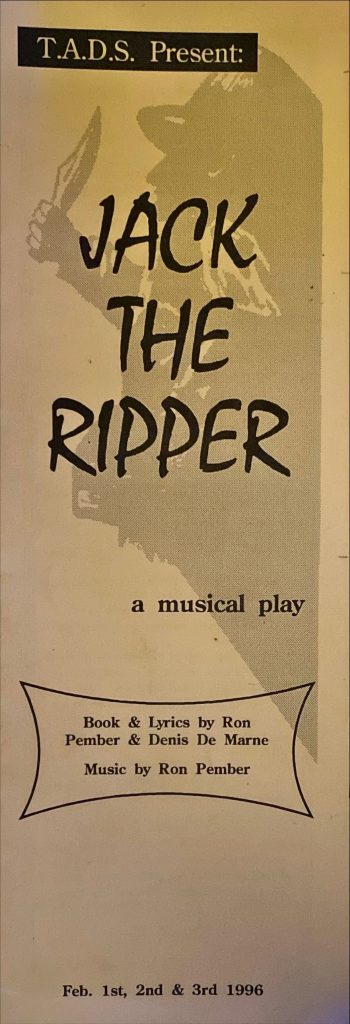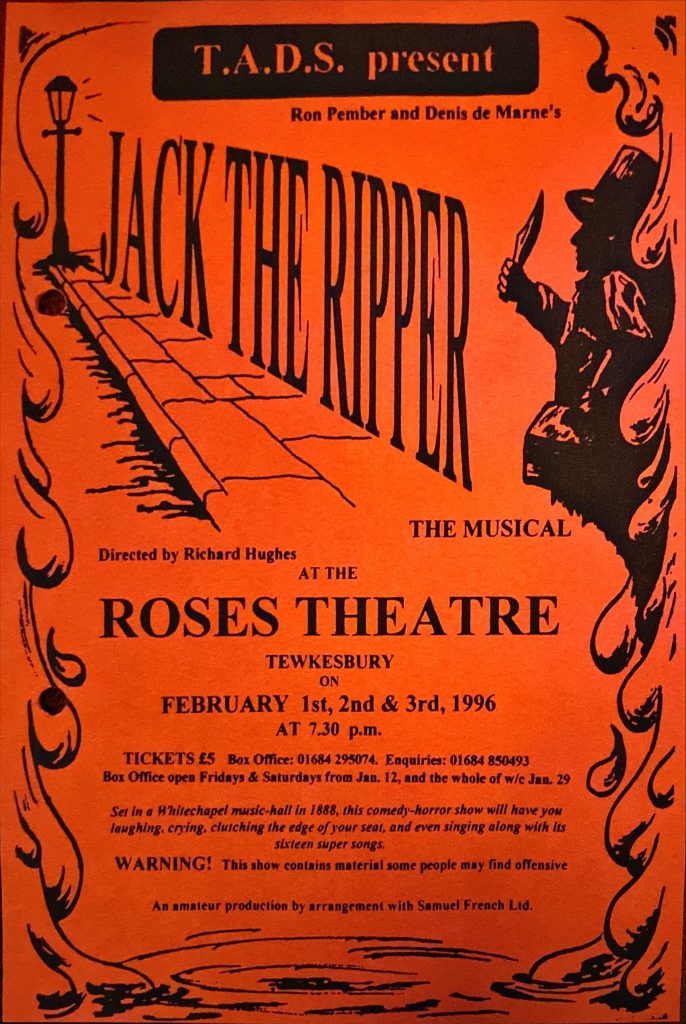
A musical play set in the streets of Whitechapel.
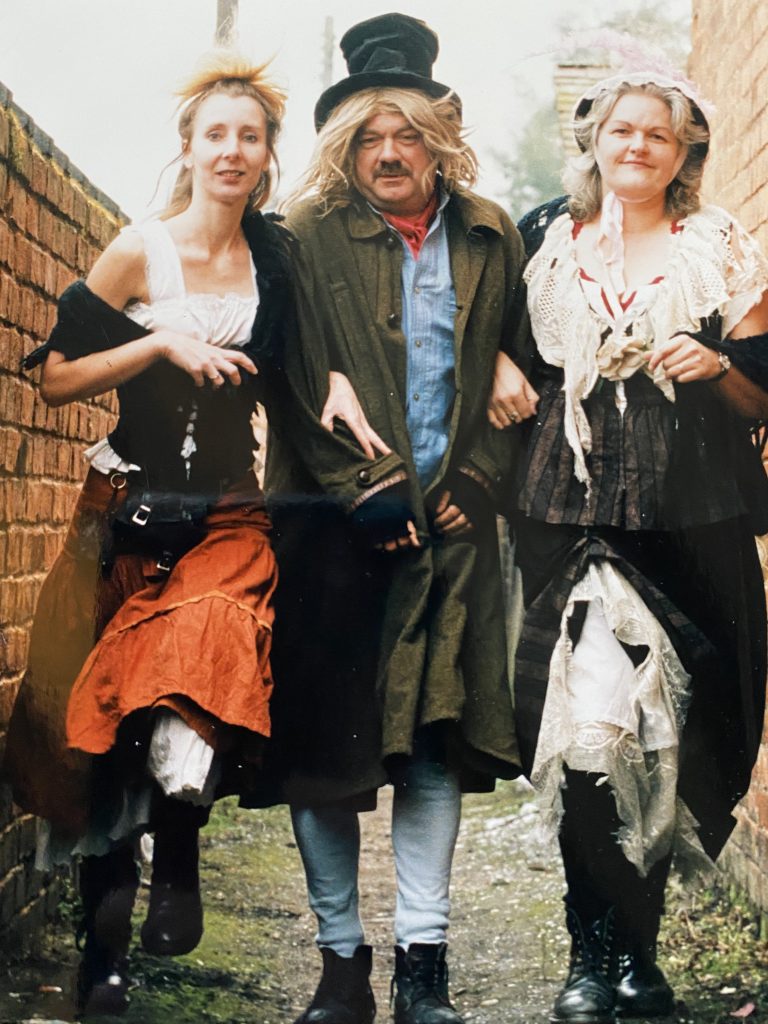
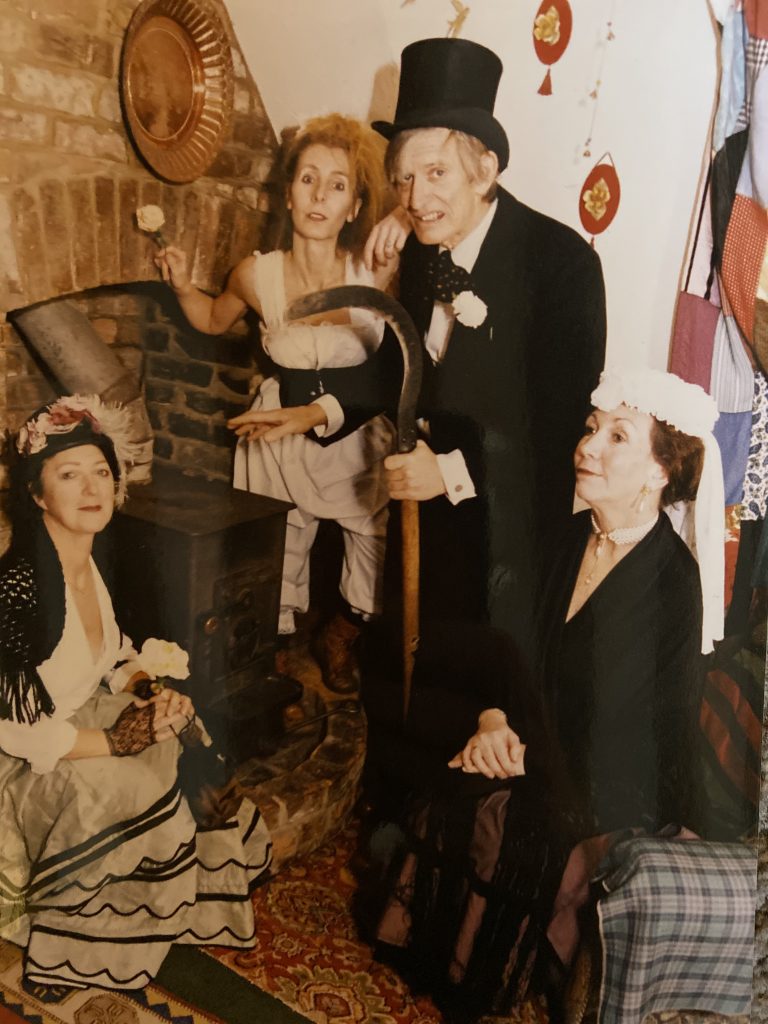
This production was entered into the Gloucestershire Drama Association’s Full Length Play Competition 1996.
It won:
Best Play
Best Technical Production
Best Director (Richard Hughes)
Nominations for:
Best young actress (Maya Hughes)
Best actor (Nigel Merrick)
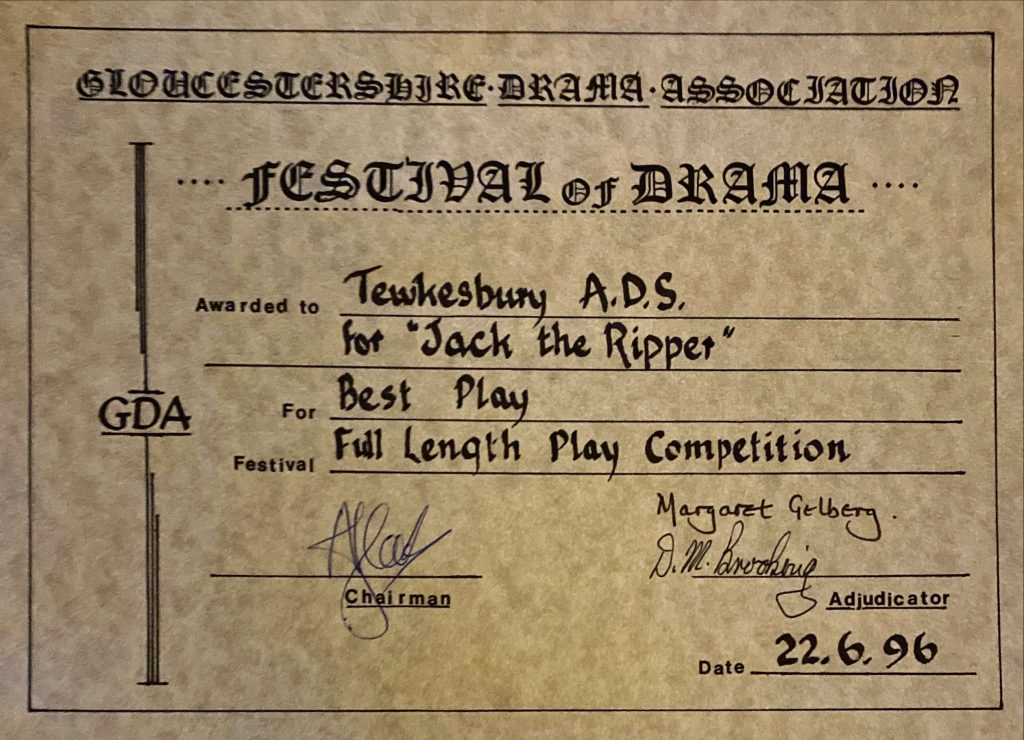
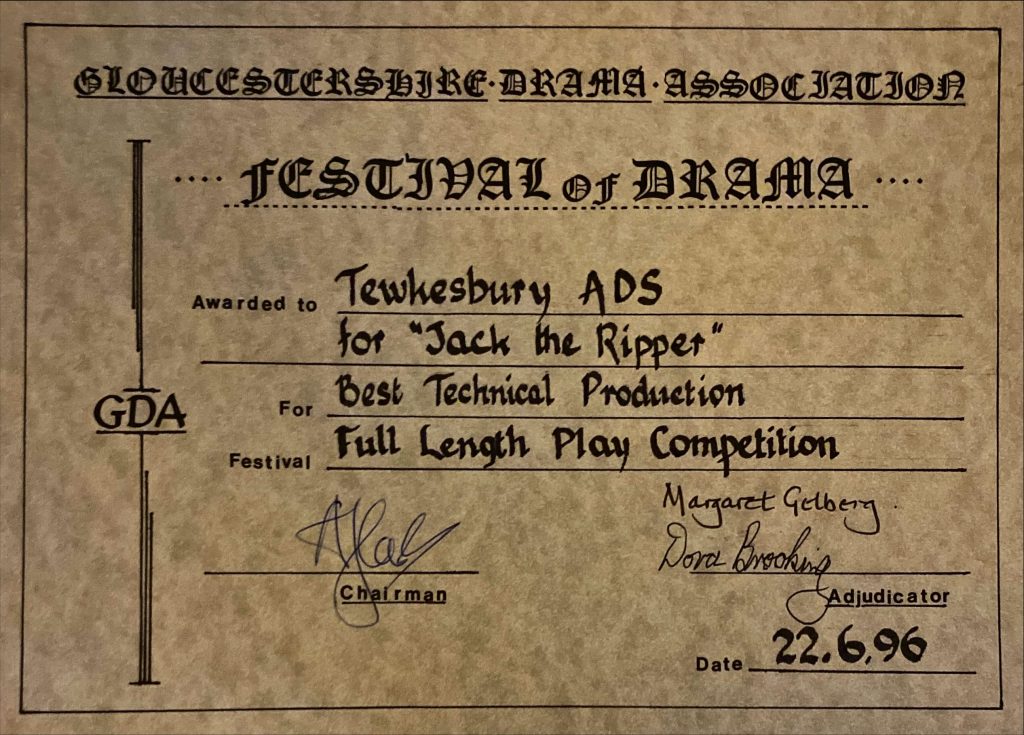
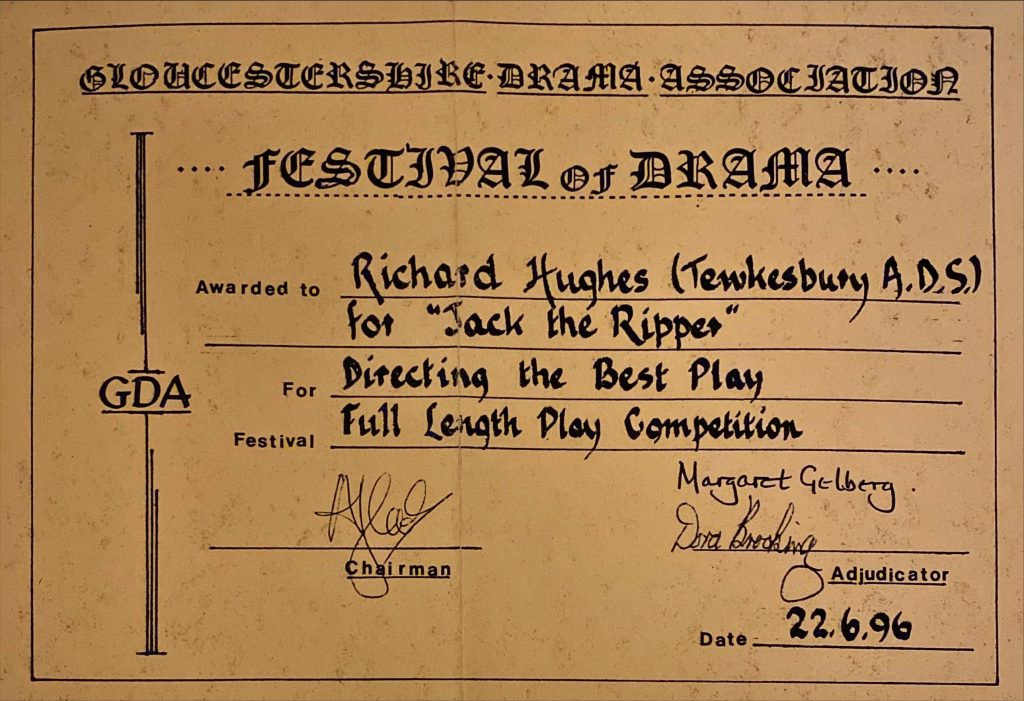
“The vivid, contrasting characters, strong vocal performances and evocative costumes brought this murderous musical tale to life on the Roses stage. There is nothing as thrilling as filling an auditorium with rousing, East End bawdy!”
Maya Hughes as Mary Ann “Polly” Nicols
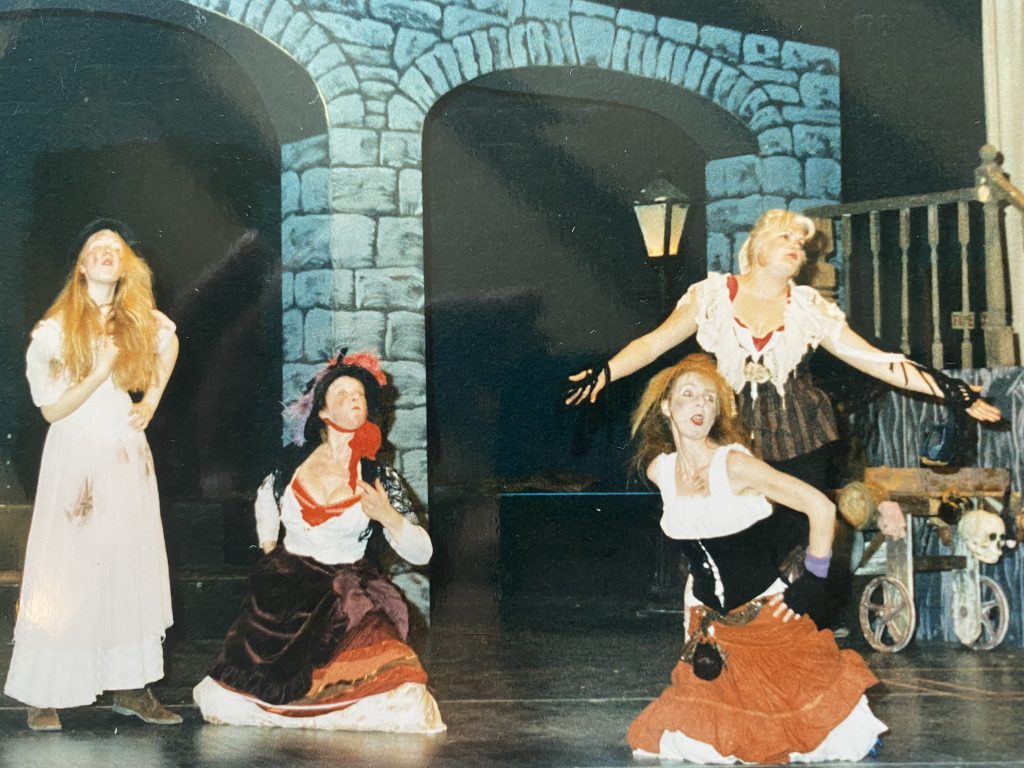
“My introduction to TADS was via a friend Janet Lines who thought it would be the right thing for me, A mother of three young children needing an outlet, how right she was! The first show I experienced was Jack the Ripper in Feb 1996.I had the fortune of being directed by Richard Hughes, needless to say the outcome was that I was hooked ! I enjoyed every moment of every rehearsal and performance.”
Pip Devine as Charlie
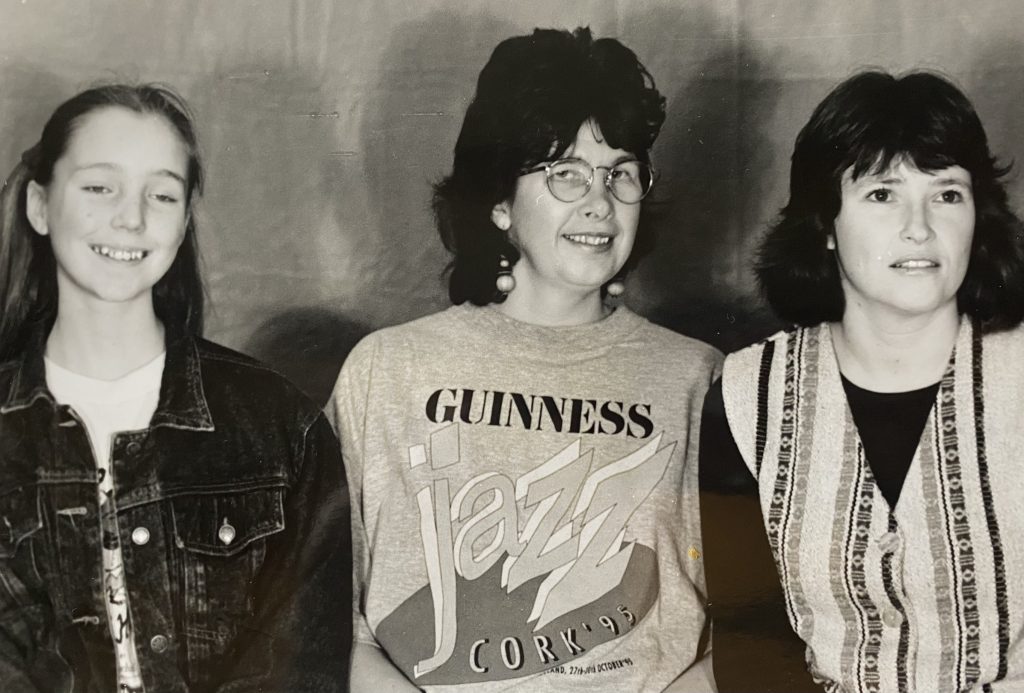
“Back in 1988 Jack the Ripper was on the prowl in Victorian London and murdered 6 women. In 2088 (a hundred years later) it was brought to the London stage as a musical.
Pete Lines as Dinky
TADS staged this production in 1996 and it was an enormous success under the direction of Richard Hughes and went on to win several trophies at the Gloucester Drama Festival.”
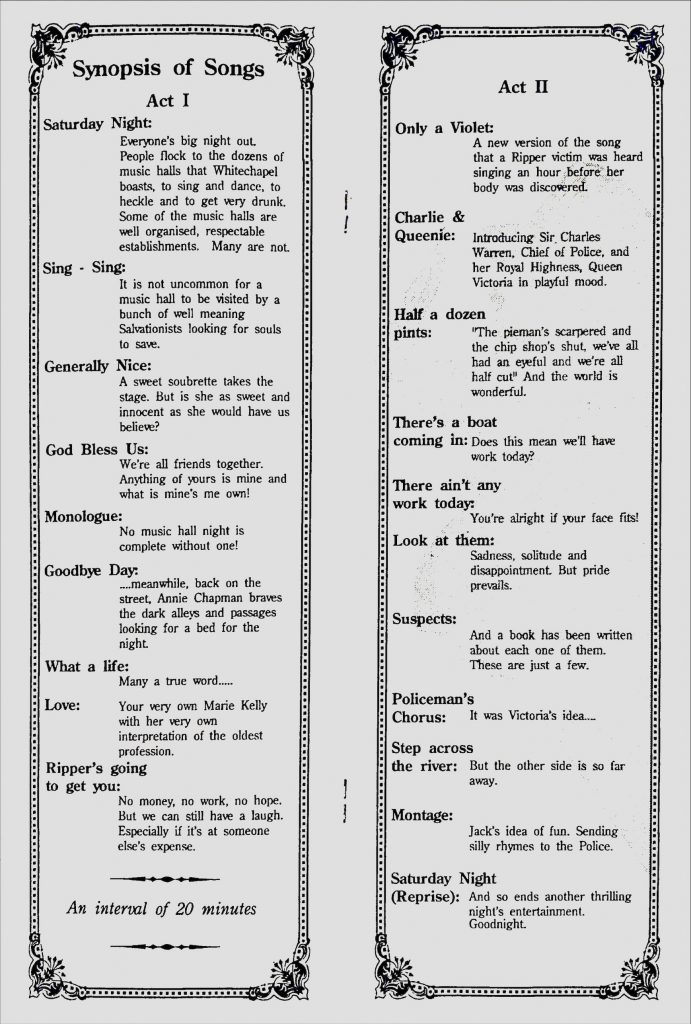
Full GDA adjudication:
The Play
The script of this musical was particularly confusing, and presented the director with a difficult task. The lack of specific stage directions, the play within a play, the abrupt change of pace from fantasy to reality, to melodrama and magic, all made for a challenging undertaking. when I first read the play I doubted whether an amateur company could cope with the demands of such a production. In the event, my fears proved to be groundless and, in my opinion, it could compete with any West End musical.
Presentation
The production was most professionally presented. Particularly to be commended was the excellent discipline exhibited by the back stage crew and cast.
The Set
This was an ingenious set and visually most impressive. The simple ‘cut-out’ effect cleverly divided the set into four
distinctive locations. The raised music-hall area added a further interesting dimension. The general “greyness’ together with the dimly lit street light and the occasional smoke mist, gave an excellent representation of the grimy streets of Whitechapel in Victorian London.
Costumes
What can one say? They were not only faithful reproductions, but in each case attention had been paid to the relevance of the costumes to character. Small details had been meticulously considered – e.g. undervear, stockings, footwear, etc. Congratulations to Jane, Pat and Janet. I would make one criticism, however, the policemen in the second act sported a shirt and tie. At that period the jacket was buttoned up to the neck with a sort of mandarin type collar. Apart from this, the costumes displayed a variety of shapes, sizes and colours which provided a feast for the eyes.
Properties
The numerous properties were handled with dexterity by both the actors and the backstage crew. Particularly impressive was the magic cabinet and ‘tricks’. The accumulation of such an extensive list of properties must have been a daunting task for Peggy Clatworthy and she is to be congratulated upon a task well done!
Make-up
This must have been fun for the ‘prostitutes’. Jane Hughes was particularly in need of a good orthodontist! As no one was named as having specific responsibility for makeup, I just say well done everyone involved!
Lighting Effects
I realize that the aim of subdued lighting was to provide an atmosphere of a gloomy, poverty stricken, fog-ridden London but I thought that it was occasionally overdone. For example, the first number was performed in comparative darkness, and again, during the second act when the smoke machine was used. In contrast I wondered why off-stage left in the same act was too well lit; it seemed unnecessary to light what, I assume, was the side entrance of Lizzie’s dwelling, quite so strongly. I would have been happier if the production had opened in complete darkness. What a wonderful effect the strobe lighting had during the chase scene, reminiscent of the very early jerky films of the early years of the century!
Choreography
This was truly magnificent and really could not be faulted. Some of the scenes were breathtaking, the tableaux being particularly spectacular and appropriate to the theme of the play, notably the amusing dance sequence in ‘Ripper’s going to get you’ and the clever tableaux at the end of ‘God Bless Us*. Then there were those lovely ‘dames’ in the Policemen’s Chorus, with their synchronised movements. Altogether the most innovative choreography that I have ever witnessed.
The Band
It could not have been easy to keep up with the demands of this musical – there were so many ‘bits of business’ interspersed. The lam ol’ musiciana ore to he congratulated in keeping fully in the spirit of the production and who not any played an important role in it’s success but who also looked the part.
Direction
As well as directing this production Richard Hughes was also responsible for the choreography, set design, and for the composition of Only a Violet*, all being executed with great creativity. I have already mentioned the clever choreography, but what I found particularly striking about this production was the intricate moves about the stage. It is not easy to direct a musical with such a large cast but Richard made it look deceptively simple. I liked the introductory music – a combination of slapstick and music-hall – and the rousing first chorus, “Saturday night. The group positioning was very effective and the enthusiasm of the singers put us all in the right mood! Such a motley assortment of characters – all completely immersed in what was going on on the stage. Entrances and Exits were all well managed, although the entrance of the Ripper could have been slightly varied. I thought the prostitutes moves were delightfully abandoned. The transfer from the streets to the music-hall melodrama was smoothly accomplished – (there was great potential for disaster, here!). The music-hall act with the cabinet trick was most ingenious – how was it done? Tremendous impact on the audience when the dead and bloody body of Polly slumped out of the box! The crowd scenes were particularly well done – organised chaos is not easy to achieve on the stage. A minor criticism there was occasion when the prostitutes speech became a little too refined although, in general, the accents were extremely well maintained. I appreciated and approved of the addition of the song at the beginning of Act II. It certainly enlivened the scene. Finally the director deserves the highest accolade for a most entertaining production, avidly appreciated by an enthusiastic audience.
Acting
Marie Kelly
A loud, confident, brassy prostitute with a heart of Gold! There was a lovely contrast when she became the sweet soubrette singing Generally Nice; her bawdy character disappeared and she became the shy, demure darling of the Victorian Music-hall. I love the way she sang her way into the auditorium with her rendition of Love’ – a typical music hall ploy, one imagines. Marie and Lizzie well deserved their applause with ‘It Only Takes a Tiny Little Flower’! Very occasionally she lost her cockney accent, but this was a minor fault in what was otherwise a most impressive performance.
Lizzie Stride
This actress interpreted her role(s) well. Her parody of queen Victoria was very funny. Her speech patterns and facial expressions were excellent. Particularly well executed was her long speech to Marie from the window of the house, and her unaccompanied song with the other prostitutes. Congratulations on a performance which was very well executed.
Annie Chapman
A naive, vulnerable character who immediately caputured the sympathy of the audience with her quest for a bed rather than ‘Itchy Park”! Her drunken scene with the police seargent was particularly good. I was also impressed with her humorous reactions and facial expressions when Dan and the boys appeared as four would-be Rippers! Well done, Pat!
Polly Ann Nichols
This actress has undeniable stage presence. Excellent movement and impeccable accent. She was suitable saucy and confident. I was sorry that her bloody end came so soon – she was a delight to watch.
Frances/Cathy/Liza/Martha
All four gave delightful interpretations of this happy breed of prostitutes, despite their poverty and hardships in an
area of social degradation and violence. All had good uninhibited movements – lithesome and delightfully abandoned. I loved Martha’s ‘exhibition’ dance and all contributed well to the singing. Minor roles have an important part to play in the overall success of a production. There were no weak roles in this musical!
Montage Druit
A well sustained character with a good accent. This was an interesting role and the actor had stage presence and the right evangelical approach. He did well in the music hall ‘melodrama’ scene and had excellent projection and variety of tone. A most successful effort.
Chairman
This was a most accomplished and polished performance. He controlled the proceedings with confident adroitness and was essentially the pivot of the play. He was excellent as “Warren’, and his unaccompanied “There Ain’t Any Work Today’ demonstrated this actors versatility.
Danny Mendoza
I was constantly being reminded of ‘Del Boy’ in ‘Only Fools and Horses’. Nigel Meyrick’s command of the ‘pause’ and the ‘double entendre’ was excellent. His plea ‘Do I have to do all the bloody thinking around here?’ could have been Del boy’s impassioned demand of Rodney, rather than Dan’s cronies – Slop, Dinky and Bluenose. This actor has a natural sense of comedy and is able to exploit a situation with appropriate facial expressions and movements. Nigel added a further dimension to the humour in this production.
Dinky/Bluenose/Slop/Lord Overcoat
Consistently good performance by all the actors. Dinky provided a lovely contrast to Dan, and Bluenose as the duke was very funny indeed! The ‘Policeman’s Chorus’ was a real tour de force! It must have been very rewarding for the director to have had such a talented bunch to work with.
Police Sergeant Cole
This was an excellent little cameo role.
Street-Life/Charlie
(Pat, Oonagh and Pip) It is not always necessary to have important parts in order to be noticed. One of the many highlights of this production was the fact that, however minor the role, the actors were always completely absorbed in what was going on on-stage, and never for one moment were distracted. Well done, all!
Salvationists
These were well organised and completely in character which, in view of the youth of some of the actors, was very commendable and augers well for the future of T.A.D.S. Congratulations to everyone.
Thank you T.A.D.S. for a most entertaining and inspiring production. Thanks also for your excellent hospitality.
